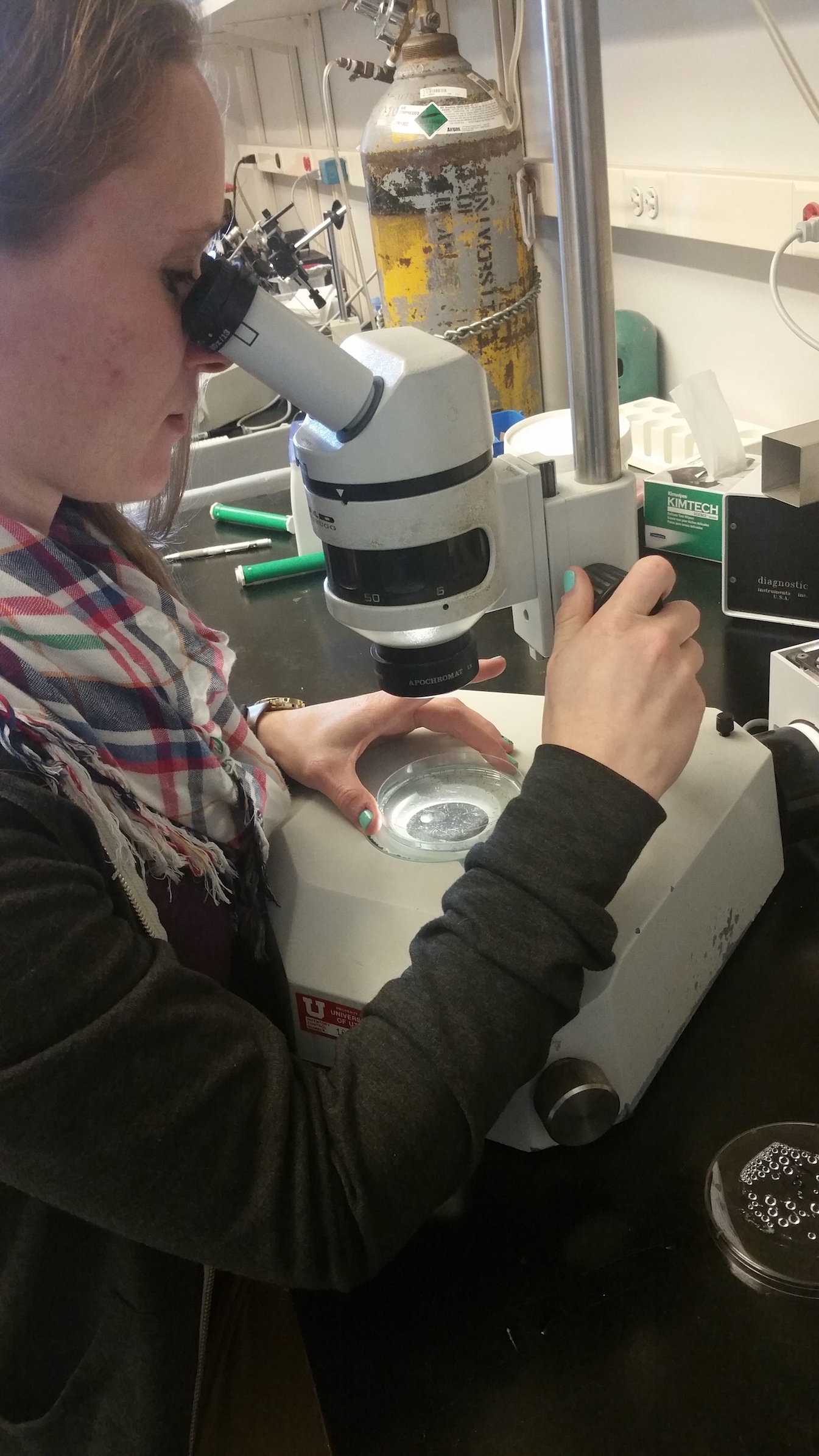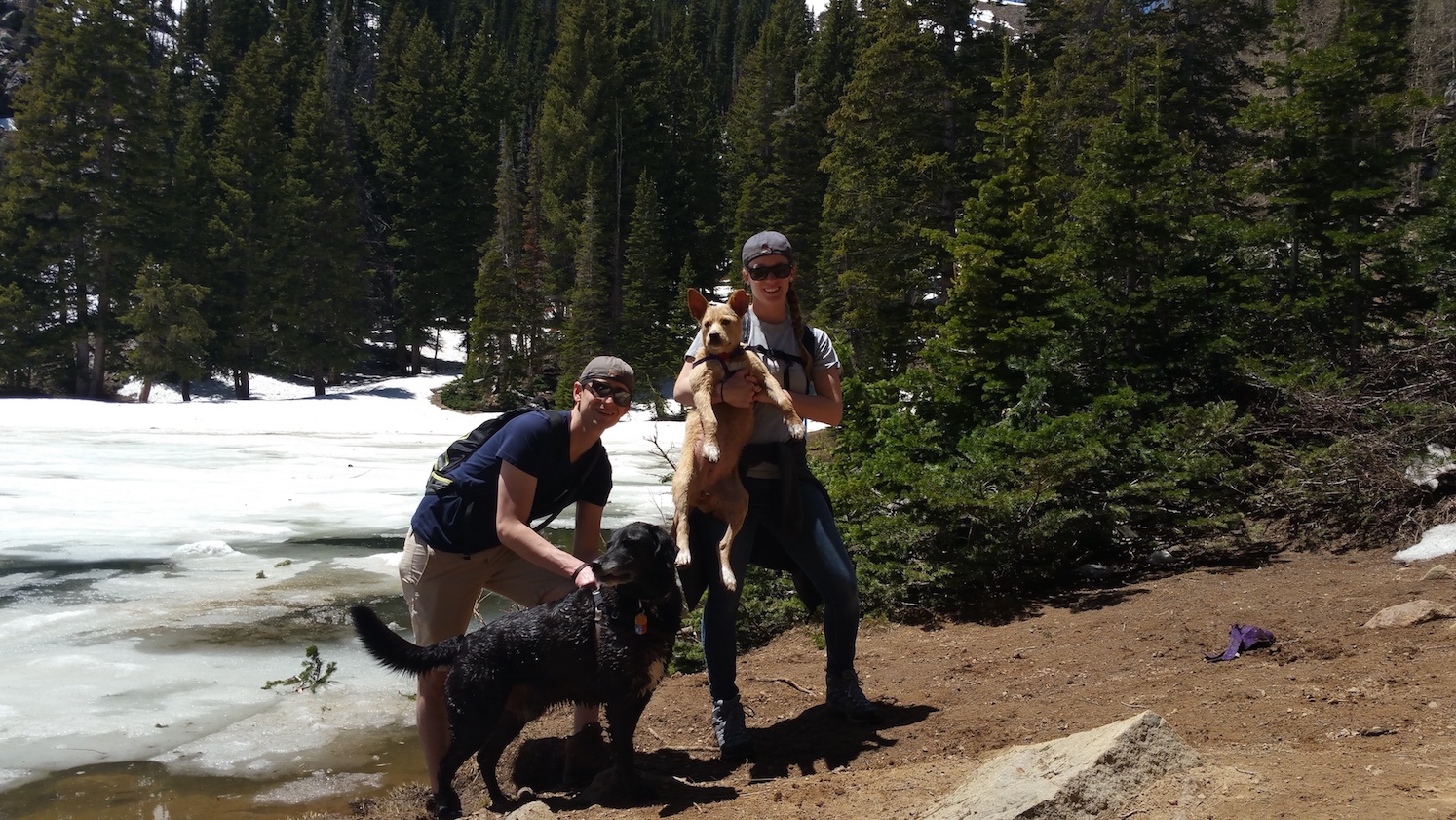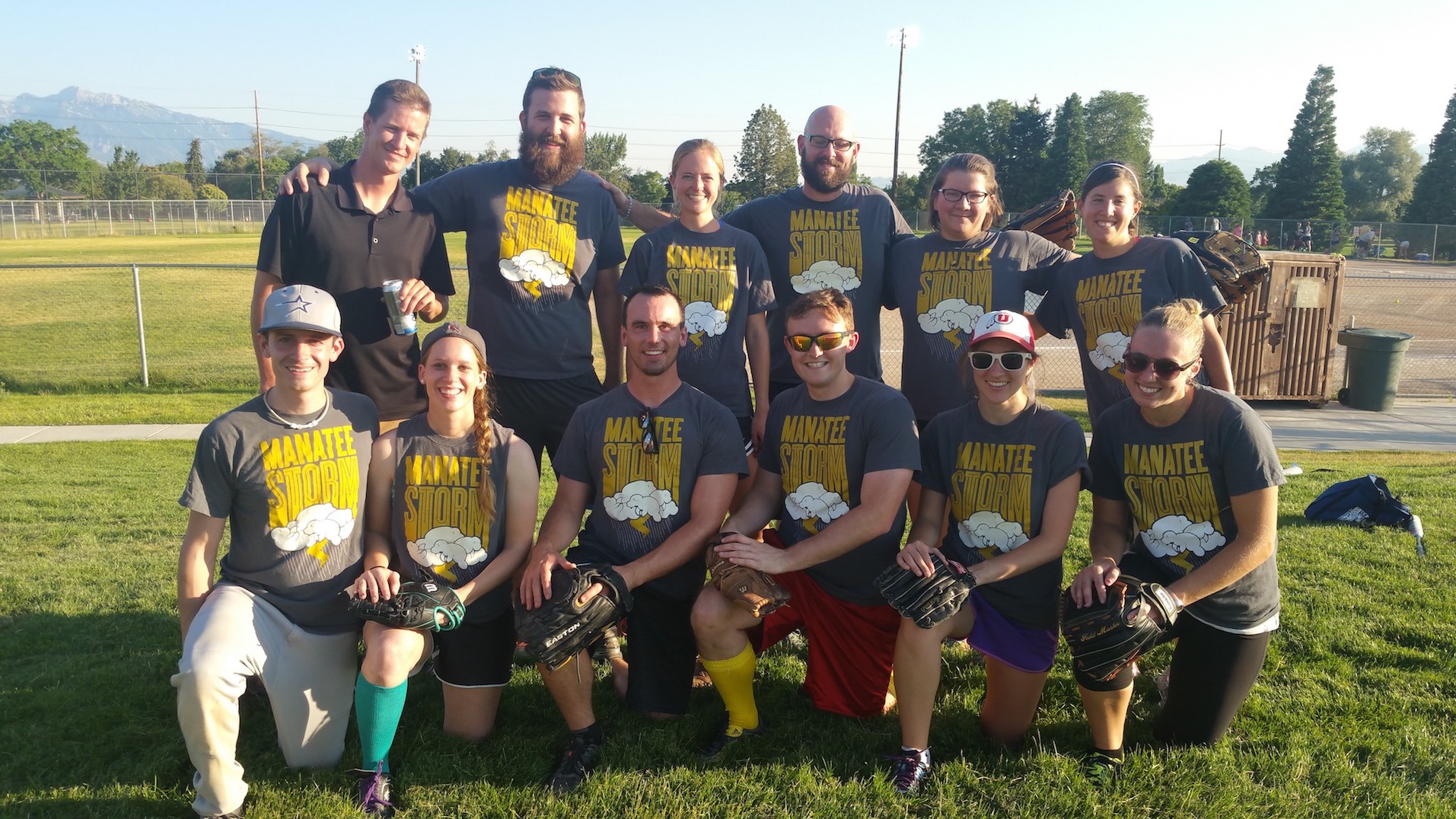Meet Dana!
Dana Klatt Shaw, Grunwald Lab (Human Genetics)
 Where are you on your graduate school journey... close to defending? Defended?
Where are you on your graduate school journey... close to defending? Defended?
I defended May 14th of this year.
What are you planning to do/doing after graduation? Industry? postdoc? other?
I have a post-doc lined up with Dr. Mayssa Mokalled at Washington University in St. Louis. There I will study natural spinal cord regeneration in adult zebrafish with the intent to inform approaches to improve the outcomes of mammalian spinal cord injury.
What has helped you get through to a successful graduate career?
Having a supportive and understanding PI is essential. David has been my biggest supporter, but also my toughest critic. A great PI is someone who guides you through your thesis, but also gives suggestions that makes your work better. My husband was extremely supportive and understanding and my dogs Gordon and Louie helped to distract me after a bad day. Graduate school is impossible without friends who help you get out of lab and you have to have mentors who are willing to give you support and encouragement.
Letter or Advice to my younger self? Do’s and don’ts...
DO:
- Find mentors early.
- Rely on your PI and committee to help you through the difficult times, and take their criticism seriously and learn from it.
- Try to read at least one journal article every day.
- Encourage others, because they need it just as much as you do.
- Find your sense of success and self-identity outside of lab. Otherwise, when experiments aren't going well, it will be really hard to pick yourself up.
- Find friends and mentors who will help you pick yourself up. Return the favor when they need it.
DON'T:
- Be afraid to learn new techniques or areas of study.
- Be afraid to fail and when you do, learn from what went wrong. Don't sulk.
-References to publications
- Intracellular calcium mobilization is required for Sonic hedgehog signaling. Klatt Shaw D*, Gunther D*, Jurynec M, Chagovetz AA, Ritchie E, and Grunwald DJ. Developmental Cell; May 21, 2018 Highlighted on Faculty of 1000. Highlighted in Best of Developmental Cell 2018 DOI: 10.1016/j.devcel.2018.04.013
- Ryanodine Receptor isotype interactions contribute to muscle fiber
- type function and development. Chagovetz AA, Ritchie E, Klatt Shaw D, Hoshijima K, and Grunwald DJ. Disease Models and Mechanisms; In Press
- Increasing the efficiency of CRISPR/Cas9-Induced mutagenesis utilizing a dual guide RNA system. Hoshijima K, Jurynec M, Klatt Shaw D, and Grunwald DJ. Developmental Cell; In Revision
- Depletion of the embryonic lamin, Lamin-like 3, disrupts DNA replication timing, leading to genomic instability. Klatt Shaw D, Wike C, and Grunwald DJ. In Preparation
- Cells tune Shh ligand-dependent Smo ciliary accumulation by mobilizing intracellular calcium. Klatt Shaw D and Grunwald DJ. In Preparation
Tell me a little about yourself. Where are you from, what degree(s) do you have? What are your interests?
I am originally from central Missouri. I received a B.S. in Biochemsitry from the University of Missouri in 2013. I decided to pursue graduate school because I am interested in understanding the finer points of basic biology and development. Outside of lab, I enjoy time with my family and my two dogs as well as anything that includes being in the outdoors.

Why did you choose the U for graduate school?
One thing that really impressed me about the University of Utah was the breadth of research that we could choose from when rotating and joining a lab. The environment is highly collaborative, and the zebrafish community is incredibly helpful and supportive! The U has an enormous shared fish facility called the CZAR and it is filled with fish from labs who work on everything from understanding signaling mechanisms in cancer to mapping the vertebrate brain.
Tell me about your lab. What do you study?
I am a member of David Grunwald’s lab, which uses zebrafish as a model system to explore a wide variety of questions about basic biology and disease. I am personally interested in early embryogenesis and development. My project explores the role of calcium signaling through Ryanodine Receptors (RyRs) in the Hedgehog (Hh) signaling pathway, one of the few intracellular signaling pathways that dictates cellular fate in the early embryo. Through the work in our lab, we have identified a novel role for RyR function in Hh signaling and cell differentiation.
My lab also works to improve techniques for zebrafish mutagenesis and genetic manipulation. Part of my project includes collaborating with my lab mates to generate targeted knock-ins using homologous recombination. We also study different aspects of muscle contraction, RNA polymerase pausing, and generating disease models for human disease causing variants.
Why did you choose to join your lab?
When I was rotating during the first year of graduate school, the most important aspect of a lab was the mentoring style of the advisor. David is a dedicated mentor, who gives his students just enough space to complete independent exploration, but is also widely available for assistance or advice. David also allows us to take our projects in our own desired course, while gently nudging us in a productive direction. Additionally, working with zebrafish as a model system is fantastic—the generation time is relatively fast, and the available live imaging approaches are beautiful and fascinating.
What do you like the most about living in Salt Lake City?
I enjoy being just down the street from the mountains. Growing up in Missouri, there was not much to look at, let alone do. After a tiring week in the lab, it is refreshing to get outdoors to relax.
What do you like the least?
About two weeks out of every year, Salt Lake City has an inversion that gives it some of the worst air quality in the US. As long as you can survive those two weeks, the rest of SLC surely makes up for it!
What do you like most about being a graduate student?
I enjoy the independence I get in choosing my own project and the next experiment. My PI is helpful and supportive, but David gives me the freedom to choose the path my thesis project will take. I also highly enjoy gaining experience mentoring. I was able to complete a non-canonical TA-ship at a local STEM high school and participate in many community outreach programs. I also enjoy learning how to more effectively communicate my science. Several times a year, I get the chance to present my thesis work to my peers in different interest groups (including developmental biology and zebrafish) and within my department.
What types of things do you do outside of class and lab?
My husband and I enjoy anything outdoors--camping, hiking, biking, snow shoeing, skiing, ect. We love to take our dogs into the mountains. We recently purchased a home and enjoy completing home renovation and decorating projects in our spare time. Several of my classmates also joined together to form a slow pitch softball team. With softball and other non-science activities, we enjoy the comradery among classmates.
What does a typical weekday look li ke for you?
ke for you?
Most of the week, I am in lab. I finished classes in the Fall of my third year of graduate school, so I now focus on lab work and completing experiments. Lab does take up most of my time during the week and once a week or so, I do complete experiments in the middle of the night. That is one drawback of working with zebrafish—some of the timepoints include completing experiments at midnight or later. I use many different techniques in lab to visualize and measure zebrafish development: microscopy—both DIC and confocal of live and fixed embryos, whole-mount in situ hybridization, immunohistochemistry, advanced genetics, and pharmacological treatments. Most days there are engaging seminars, including a weekly departmental research-in-progress and journal club talk. Students in the Human Genetics department are required to give one RIP and one journal club per year, which is very helpful to become comfortable with talking to peers about science. I spend a considerable amount of time writing or proofing grant applications or publications, either for myself or for colleagues. Depending on what was planned that day, I wrap up experiments and head home around 6 PM, just in time for dinner.
I do have time most weeknights to have dinner with my husband and exercise at the gym on campus. My nightly schedule really depends on what experiments I have planned for that week and what timepoints I need to make. One thing nice about work in David’s lab is that scheduling tends to be flexible.
What does a typical weekend look like for you?
Depending on what experiments I am completing, I do come into lab at least for a few minutes each weekend. Working with zebrafish sometimes requires certain aspects of experiments be completed on a Saturday or Sunday. For the rest of the time, I spend skiing with friends and classmates at Snowbird or hiking in the nearby mountains.
What advice would you give to someone applying and interviewing for graduate school?
Ask questions of both the professors and students—about science and life outside of lab. Lab work is an incredibly important aspect of graduate school, but it is also imperative that you enjoy the city and state where you work and can find hobbies to entertain you outside of lab. Also, be open to different types of science. I came into graduate school with, what I thought was, a very concrete idea of what I wanted to research. I allowed myself to complete a rotation that was very different from this concrete idea and ended up joining that lab! Although you may have been exposed to science prior to applying to graduate school, be willing to try and learn something different.
